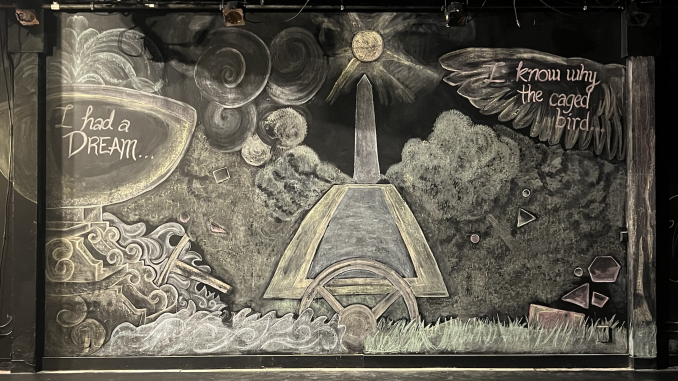
Three self-published books, four plays (one of which has already made its way to Broadway), a live-recorded album, six film scripts, 4,273 poems and as of Nov. 14, a PBS-produced fictional documentary; SUNY New Paltz class of 2019 alumni Lester Mayers has fully taken hold of the theater community across the country in the almost four years since he did his last undergraduate performance at Parker Theater. A few weeks ago, he was able to make a triumphant return to the old stomping grounds – the place where he turned from student to paragon – with a career-changing opportunity.
Connie Rotunda, a tenured professor of performance at New Paltz and Mayer’s old director, got a call from PBS a few weeks prior to the shoot on Nov. 14, asking if she had any performance pieces that could be included in their 2023 Martin Luther King Day special. She immediately called Mayers, a trusted colleague with a well-known, mile-long portfolio, knowing that he’d have the perfect piece to present; she was ultimately right. Mayers picked a play that he had written a while back while he was working with Suzan Lori-Parks entitled “Eye to Eye; Soul to Soul.”
“The original story is that Maya Angelou cannot confess to James Baldwin that she loves her husband. Angelou is the last name that she got from her husband, who is white. It was Baldwin that said to her, ‘Maya, you say you have courage but you lack the courage to say that you love this man who brings you so much joy.’ And now, the King was assassinated on Maya’s 40th birthday. What if I reimagined that he never got on that plane to Memphis, but instead went to her birthday party,” says Mayers. “So I put those two in a room, and I made them have a conversation.”
“This piece is supposed to focus on love and the courage to love as a way of retelling history in reclamation. I think that we live in America, and one of two things, one, black people’s history has not been either told properly, or it has not been recorded at all. And so it’s a part of my work and my duty to not only reimagine what life could be, but also allow us to see our historic figures eye-to-eye,” said Mayers, proudly. “To look at them in a way where we respect them, but we don’t put them up so high that their greatness is untouchable or unachievable. In a way where we can use their greatness as fuel to move forward with love, power and creativity. So that’s what it’s really about; a story about finding the courage to love.”
There is something timeless and ethereal about the way Mayers analyzes the world. Where other people go about their day focusing only on what is in their physical reality, Mayers has a bird’s-eye view of everything abstract and complicated happening in the metaphysical reality of all sentient beings. With pen, paper and 25 years, he is doing more for universal peace than the thousands of years of sticks and stones ever did.
“I think Lester is amazing,” says fourth-year theater and performance major Angelina Bell, who was casted as Maya Angelou. “I was an incoming freshman when he was a senior. I first met him at orientation in Parker Theater and it’s so funny because we were standing at the same exact place the day of the shoot. It was a full circle moment for me.”
Nathan Benitez, a fellow fourth-year theater and performance major was casted to play the King to Bell’s Angelou. Not only did he play one of the most influential leaders in civil rights history, he also designed the mural that was used as the backdrop for the performance. “The whole experience just came from analyzing the dialogue,” says Benitez. “Being able to step into that role and represent someone who is an icon, it was very inspiring, but the real magic came from Lester’s script; it’s very profound and he’s a fantastic writer.”
Mayers is starting a social movement, and “Eye to Eye; Soul to Soul” which is airing in January 2023 on PBS, is just the beginning. “When I write, my hope always is that people can experience my work and make them feel less alone,” says Mayers. “And to let them know that there is no shame in living. That’s the essential theme, it all goes back to love. People are so afraid to admit that they love life, that they love other people, and that they want to remove the categories that society has created that keep us in boxes and separated from loving each other. It all goes back to removing shame. I have no shame.”
